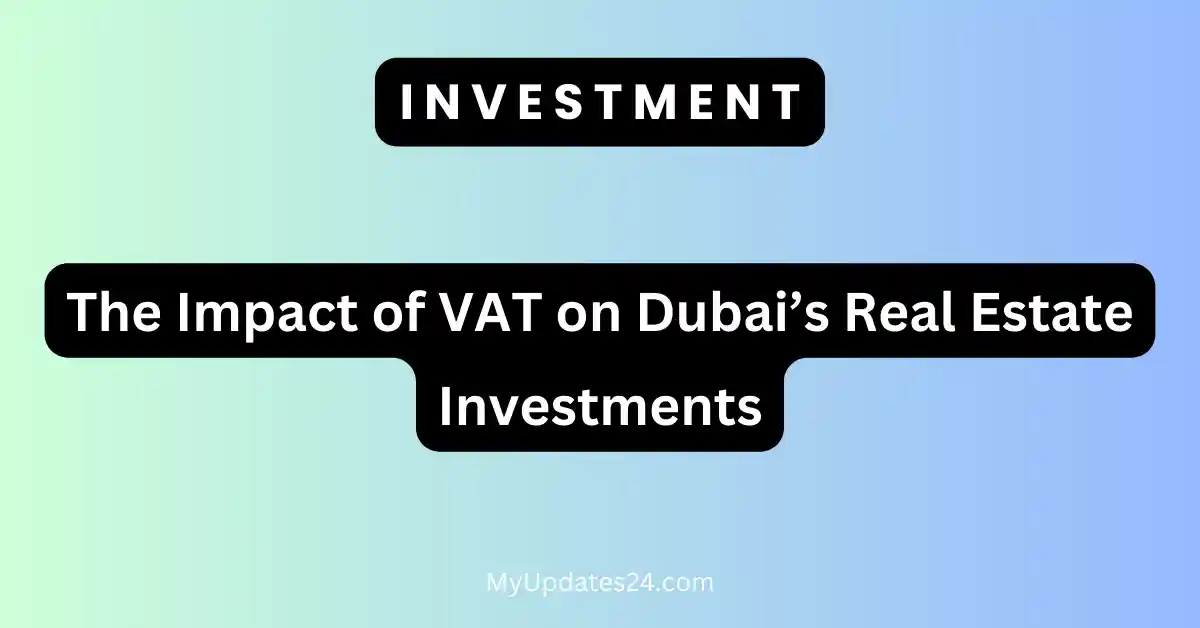Explore how VAT affects Dubai’s real estate market, including its influence on property investments, developers, and buyers. Stay informed to make profitable decisions.
Dubai has been a prime destination for real estate investors due to its strategic location, high rental yields, and tax-free appeal. However, the introduction of Value Added Tax (VAT) in 2018 at a standard rate of 5% has changed the dynamics of the market. This article explores the implications of VAT on real estate investments in Dubai, its effect on stakeholders, and strategies to adapt to the new tax landscape.
What is VAT, and How Does It Apply to Real Estate in Dubai?
VAT is a consumption tax applied to the purchase of goods and services. In Dubai’s real estate sector, VAT has varying applications depending on the nature of the property and the transaction.
VAT Application on Different Property Types
| Property Type | VAT Applicability |
|---|---|
| Residential Properties | Exempt for sales and leases of completed properties; 5% for services. |
| Commercial Properties | 5% VAT on sales and leases. |
| Off-Plan Properties | Zero-rated for the first supply within three years of completion. |
| Mixed-Use Properties | Proportionate VAT based on the usage (residential/commercial). |
The Positive and Negative Impacts of VAT on Real Estate Investments
Positive Impacts
- Transparency: VAT regulation enforces documentation, promoting accountability among developers and investors.
- Investor Confidence: Tax compliance increases the market’s credibility, attracting foreign investors.
- Stabilized Market: Reduces speculative buying, leading to a more stable real estate environment.
Negative Impacts
- Increased Costs: Additional VAT on services and commercial properties increases overall expenses for investors.
- Reduced Margins: Landlords and developers bear the tax burden in competitive markets, affecting profitability.
- Complex Transactions: The need for VAT registration and compliance adds administrative overhead.
Key Considerations for Investors
Investors must account for VAT implications when entering Dubai’s real estate market.
1. Cost Analysis
Factor in the 5% VAT when calculating potential returns, especially for commercial properties.
2. Off-Plan Opportunities
Off-plan properties can be a strategic investment since they are zero-rated during the initial supply phase.
3. VAT Registration
Developers and landlords earning more than AED 375,000 annually must register for VAT.
Cost Comparison Before and After VAT
| Scenario | Cost Without VAT (AED) | Cost With VAT (AED) |
|---|---|---|
| Residential Property Purchase | 2,000,000 | 2,000,000 (exempt) |
| Commercial Property Purchase | 2,000,000 | 2,100,000 |
| Property Maintenance Services | 10,000 | 10,500 |
How Developers and Landlords Are Adapting
Developers and landlords have taken steps to mitigate the impact of VAT:
- Absorbing VAT Costs: Some developers offer VAT-inclusive prices to attract buyers.
- Promotional Discounts: Reduced property prices or service charges offset the VAT burden.
- Flexible Payment Plans: Extended installment plans make it easier for buyers to manage additional costs.
Strategies for Buyers and Investors
1. Focus on Residential Properties
Since residential properties are VAT-exempt, they remain a cost-effective option for investors.
2. Negotiate With Developers
Seek VAT-inclusive deals or benefits such as waived service charges.
3. Understand Zero-Rated Supplies
Explore zero-rated off-plan properties to minimize upfront tax burdens.
VAT Savings on Off-Plan Properties
| Off-Plan Property Price (AED) | VAT at 5% (AED) | VAT Savings (AED) |
|---|---|---|
| 1,000,000 | 50,000 | 50,000 |
| 2,000,000 | 100,000 | 100,000 |
Tips & Tricks for Maximizing Returns Amid VAT
- Consult Tax Advisors: Seek professional advice for VAT compliance and optimization.
- Diversify Investments: Mix residential and commercial properties to balance VAT impact.
- Monitor Regulatory Updates: Stay informed about changes in VAT laws affecting real estate.
- Leverage Exemptions: Focus on VAT-exempt services and properties to reduce costs.
- Utilize Refunds: If eligible, claim input VAT refunds to offset expenses.
Frequently Asked Questions (FAQs)
- Does VAT apply to residential properties in Dubai?
VAT does not apply to the sale or lease of completed residential properties, but it applies to related services. - Are commercial property transactions subject to VAT?
Yes, a 5% VAT is charged on the sale or lease of commercial properties. - What is a zero-rated property in Dubai?
Zero-rated properties, such as new residential units sold within three years of completion, are exempt from VAT. - Can investors claim VAT refunds?
Eligible investors can claim input VAT incurred on certain expenses, such as construction. - How does VAT impact service charges in real estate?
VAT applies to property maintenance and management services, increasing the overall cost. - Do landlords need to register for VAT?
Landlords earning over AED 375,000 annually from rental income must register for VAT. - How can developers reduce VAT’s impact?
Developers can offer VAT-inclusive deals or promotional discounts to attract buyers. - What are the benefits of off-plan properties under VAT laws?
Off-plan properties are zero-rated during their initial sale phase, offering significant tax savings. - Does VAT affect foreign investors?
Yes, VAT applies uniformly, but foreign investors can benefit from exemptions and refunds in certain scenarios. - What documents are needed for VAT registration?
A valid trade license, Emirates ID, and proof of annual turnover are required for VAT registration.
Advantages and Disadvantages of VAT on Real Estate
| Advantages | Disadvantages |
|---|---|
| Promotes market transparency | Increases property and service costs |
| Builds investor confidence | Reduces margins for landlords and developers |
| Encourages stable market growth | Adds administrative complexity for compliance |
Conclusion
VAT has brought both challenges and opportunities to Dubai’s real estate sector. While it increases costs, it also enhances market transparency and stability, making it more appealing to long-term investors. By understanding VAT implications and employing strategic investment practices, buyers and developers can thrive in this evolving landscape.



“This article provides a balanced view of VAT’s impact on Dubai’s real estate market, helping investors and developers navigate the changes. Adding expert insights and real-life scenarios could further enrich the content.”